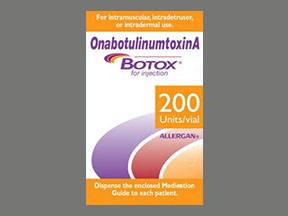
Botox Coupons & Savings Card – Discount Prices from $1290.22
My prescription
Edit
200UNIT, Botox (1 Solution Reconstituted)
Select pharmacy

Walgreens
$1290.22
COUPON PRICE
Albertsons
$1321.92
COUPON PRICE
Walmart
$1358.98
COUPON PRICEBotox savings card
Show this card to your pharmacist
Walgreens
$1290.22
BIN
ID
PCN
GRP
015995
LHKRA656155
GDC
DR33
Powered by
Related acetylcholine release inhibitors prescriptions
More prescriptions for spasticity
Related acetylcholine release inhibitors prescriptions
More prescriptions for spasticity
Price history for Botox
1 Solution Reconstituted, 200UNIT
Average retail price for Botox
Average SaveHealth price for Botox
Our price history data is based on aggregated prescription data collected from participating pharmacies in America. Our prescription data updates daily to reflect the latest price changes. If you notice a missing data point, it means there wasn't sufficient data available to generate a monetary value for that date.
*Retail prices are based on pharmacy claims data, and may not be accurate when we don't have enough claims.
Botox dosage forms
Dosage Quantity Price from Per unit 100UNIT 1 Solution Reconstituted $667.74 $667.74 200UNIT 1 Solution Reconstituted $1343.48 $1343.48
| Dosage | Quantity | Price from | Per unit |
|---|---|---|---|
| 100UNIT | 1 Solution Reconstituted | $667.74 | $667.74 |
| 200UNIT | 1 Solution Reconstituted | $1343.48 | $1343.48 |
What does Botox actually do?
Botox works by temporarily paralyzing or relaxing specific muscles. It does this by blocking the release of a neurotransmitter called acetylcholine, which is responsible for muscle contraction. This effect can reduce the appearance of wrinkles and fine lines, particularly in areas like the forehead, around the eyes, and between the eyebrows. Additionally, Botox is used for various medical conditions, such as chronic migraines, excessive sweating, and certain muscle disorders.
How much does Botox cost?
The cost of Botox can vary depending on several factors, including the geographic location, the provider's expertise, and the number of units required for treatment. On average, Botox can range from $10 to $20 per unit. A typical treatment session may require anywhere from 20 to 60 units, depending on the area being treated and the desired results. It's advisable for individuals to consult with a licensed provider for a more accurate estimate based on their specific needs.
What is the biggest risk of Botox?
The biggest risk of Botox is the potential for the toxin to spread beyond the injection site, which can lead to symptoms such as muscle weakness, difficulty breathing, swallowing issues, or drooping eyelids. It is important for Botox to be administered by a qualified healthcare professional to minimize these risks.
Will insurance pay for Botox?
Insurance coverage for Botox depends on the reason for its use. If Botox is being used for cosmetic purposes, such as reducing wrinkles, it is typically not covered by insurance. However, if it is prescribed for medical conditions, such as chronic migraines, excessive sweating, or certain muscle disorders, insurance may cover it. It is important for the individual to check with their specific insurance provider to understand the coverage details and any necessary pre-authorization requirements.
Who shouldn't get Botox?
Botox should generally be avoided by individuals who are pregnant or breastfeeding, those with a known allergy to any of the ingredients in Botox, and individuals with certain neurological disorders. Additionally, people with an active infection at the proposed injection site should not receive Botox. It is important for individuals to consult with a healthcare provider to determine if Botox is appropriate for them, considering their specific medical history and conditions.
